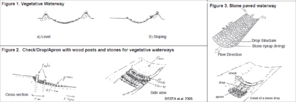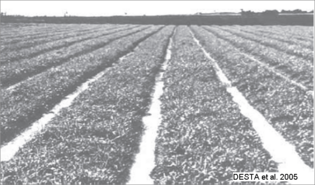Micro-hydro Power (MHP) Projects - Mitigation and Intervention Techniques - Flood Control and Improved Drainage
From energypedia
Overview
► Back to the overview "Mitigation and Intervention Techniques Related to Micro-hydro Power (MHP) Projects"
Flood Control and Improved Drainage
Waterways (Vegetative and Stone Paved)
| Objectives: A waterway is a natural or artificial drainage channel constructed along the steepest slope or in a valley to receive/accommodate runoff from cut-off drains and graded terraces/bunds. The waterway carries the run-off to rivers, reservoirs or gullies safely without creating erosion. A vegetative waterway can be constructed in areas without stones. The main advantage is that waterways can be constructed for both very small and large size catchments, thus accommodating individual or communal needs for drainage and evacuation/use of excess run-off. Paved waterways are suitable in steeper terrains and areas with large amount of stones. |
Cut-off Drains
|
Graded Soil Bund
| Objectives: Graded soil bund is similar in description with level soil bund. However, graded soil bund is upto a maximum of 1% inclined against the contour so that excess runoff is allowed to drain to the adjoining natural or artificial waterways. It is also possible and necessary to include tied ridges smaller in height within the channel of the terrace. The stored water within the ties can infiltrate into the soil while any above that height is drained out. Graded soil bunds can be made to gradually develop in to benched type terraces through careful maintenance. Any integration of other measures such as stabilization and composting can be applied as it can be applied on level bunds. |
Graded Fanya Juu
|
Improved Surface Drainage for Increasing Productivity of Vertisols and Soils with Vertic Properties
|
Further Information
References
DESTA, L. et al. (2005): Part 1: Community Based Participatory Watershed Development: A Guideline. Addis Ababa: Ministry of Agriculture and Rural Development.






















